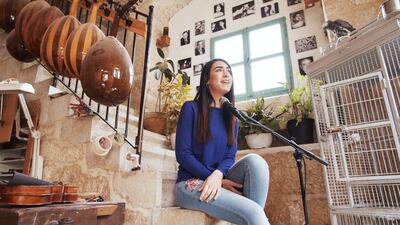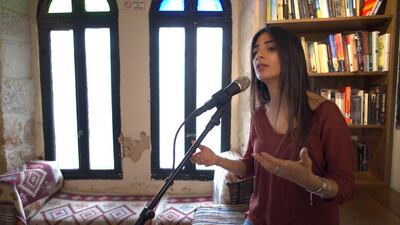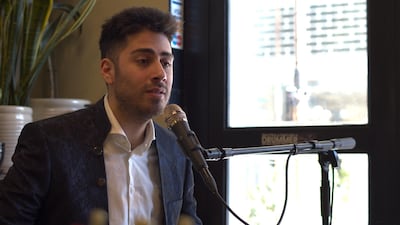Of all the popular live-session music shows online today, NPR's Tiny Desk resonates the most with John Keating.
"It gives you a really intimate feeling with the artist. It's makes anything digestible. I love acoustic music and I love jazz but when I see a rapper on Tiny Desk, all of a sudden, I can take it. I can digest it. Because the setting is very intimate and it feels very authentic," the musician and record producer tells The National.
Now, Ireland-born Keating is taking the Tiny Desk aesthetic further; to conflict zones around the world.
The philanthropist, who plays music under the moniker Johno, founded the Delia Arts Foundation in 2018, which supports musicians in conflict zones.
Now, Keating, who was born in Ireland, is taking the Tiny Desk aesthetic further – to conflict zones across the world. The philanthropist, who performs under the moniker Johno, founded the Delia Arts Foundation in 2018, which supports musicians in conflict zones.
After two years of working with musicians in Palestine and more than a decade working and performing with artists across Africa and the Middle East, Keating saw a gap in the market. His latest project is a video series called The Delia Sessions, which offers a live music platform featuring up-and-coming Palestinian musicians.
The series of five-minute live shows has an authentic and stripped-back feel, with no sound engineering being done behind the scenes. Although production tricks are there, they are designed feel subtle to allow the viewer to feel "in the moment".
Keating says he wants to use the platform to educate western audiences about countries where wars are being waged.
The first four videos feature Palestinian artists Rola Milad Azar, Milad Fatouleh and Lina Sleibi as they perform Arabic folk songs in an informal, acoustic concert setting. However, Arabic folk music is not always easy on western ears.
Many traditional tracks are quite long and heavy on reverb, so Keating says he has reworked them for the series so they are easier for audiences to listen to.
"We do a lot of taking traditional songs from sometimes 12 to 15 minutes in duration and paring them down to two or three minutes," Keating says. "We are also making the songs a bit more communicative musically, in terms of adding some harmonies and putting them in a form that's more familiar to westerners, who are accustomed to hearing an intro, a verse, and a chorus."
The plan is for recordings of the sessions to be made available on streaming platforms shortly after each release. The first video in the series came out last month and features a performance and interview with Rola Milad Azar, 27, an independent vocalist and musician from Nazareth. Since recording for The Delia Sessions, she has been singing in concerts and festivals throughout the world. Her first three public performances after recording for The Delia Sessions project were at Stukafest in the Dutch city of Delft.
"It was absolutely wild," she says. "I'm used to singing in a traditional Arabic context, a seated audience in a concert hall, and everything is quite formal and distant. In Europe we can take more risks and try things out.
"For example, yesterday we taught the audience some lines from the songs – even though none of them spoke any Arabic – and gave them some choral parts to sing, and invited some local guys to rap and breakdance with us.
By the end of the show, the whole crowd got up singing and dancing as we played along and it was very exciting. I have never had anything like that before."
In the video, Azar performs the traditional folk songs Ya Mayla Alghossoun and Al Maya and discusses how tough it is to make a living by playing music in Palestine. "Al Maya and Ya Mayla are both traditional Arabic love songs, known and cherished by many," she says. "We took these songs and gave them a simple and 'stripped down' western arrangement, using just a bit of acoustic guitar and percussion."
But touring internationally as a Palestinian doesn't come without challenges. "Everything is sensitive and many things are easily stigmatised and stereotyped," she says. "There are also real issues regarding basic logistical challenges for Palestinians and there are also always economic challenges in trying to produce and perform music in Palestine, as the scene is very small and opportunities are scarce."
But Azar believes projects such as The Delia Sessions will give musicians from the occupied territories more of a voice on the international stage. "I want to present Palestine in a more beautiful way," she says. "A lot of my repertoire consists of traditional Palestinian songs and I put a lot of effort into making the culture and its assets accessible and appreciated in the West as well."
The Delia Arts Foundation plans to open a music centre in the Gaza Strip to offer young musicians opportunities to practise their craft and record songs. The aim of the Delia Arts Centre, which opens its doors this month at Al Senaa St Dalloul building in Gaza city, will address the lack of infrastructure for young musicians in Palestine.
With a target audience of artists aged between 15 and 35, it will be the first public space in the occupied territories where musicians can hone their music skills, build local or international careers and create a community where they can actively support and learn from one another.
The need for such a space in Gaza has repeatedly and urgently surfaced in conversations with Palestinian musicians, Keating says.
Over the coming years, more locations will be identified, he says, with the goal to expand the project into a network of cultural spaces that will be accessible at a low cost to musicians living in conflict zones and marginalised communities in such areas.
He says he hopes the project will bring young, like-minded people together and protect them from a life of violence, marginalisation or extremism. Crowdfunding for the centre began this month. "The artists in these places have the best and most important stories to tell," Keating says.
"More often than not they don't have the facilities to tell these stories or the budget to do so. And you can see it in Palestine more than anywhere else – they can't even move around.
"We are also really into the public taking part, obviously by funding this and finding the resources, but also by taking part in the content creation process and being in dialogue with these artists directly and trying to build the platform to do so."
Keating says he hopes future sessions will include acts from a broad variety of genres, from rappers and rock bands to electronic artists, with all of them creating more modern manifestations of the Palestinian musical tradition. Keating says he hopes to take The Delia Sessions to other countries that have been affected by violence, such as Syria, Sudan, Pakistan and perhaps even Morocco.
"Our idea is to get to a point where, for very little money, we can produce and upload videos from various regions to our channel and, very much like Tiny Desk, it will help unknown artists get exposure and help well-known artists in these areas get new exposure worldwide," he says.
Keating aims to put out a video once a month from the end of the year. A performance from Gaza as part of the series will be released before by about the start of next month. "We are also contemplating bringing this format into Europe, sort of like a small Delia Sessions festival," he says.
But to pull that off, Keating says he knows that he needs to gain enough public support for his project. "We hope to get enough exposure for this format and raise enough funding so that we can repeat this model anywhere else in the world and show that this kind of support is needed for artists," he says. "As a global music industry, we have a great responsibility to help their message get across."
Videos of The Delia Sessions will be available for free on the Delia Arts Foundation's YouTube channel and at www.delia-arts.org



